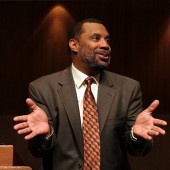The word vocation has in recent years become synonymous with what we eventually do to earn a living. But the origins of the word vocation have a rich history in the biblical narrative and in the tradition of the church.
The word vocation comes from the Latin word vocare, which is a direct reference to the notion that one is called. But, in order to be called, there must be a caller. In the story of the Bible, God has been calling his people and his creation from the beginning.
From the first chapter of Genesis when, as Wheaton College professor John Walton proposes, he called domains of creation into their functional purposes, to his calling of Noah, to Abraham, Moses, Samuel, and David.
Then there is Jesus, calling his disciples – calling them, and us, to follow him.
But God’s call to us in Jesus is not primarily about assenting to a particular set of abstract propositions about the nature of how the world works.
It is first a call to relationship with Him, one in which we live as if Jesus is not only our friend, but also our King; and, as such, He is Lord of everything that exists and that we do.
In the biblical narrative, our King has placed His Kingdom, everything about our world, under the stewardship of humans.
He has called us, therefore, not merely to believe Him in order to go to heaven when we die, but also as friends of the King who are in relationship with Him to steward in His name all of the vocational domains that we occupy—over which he is Lord.
It was God’s intention from the beginning that we take great joy in stewarding, creating, and curating them.
But shame, also from the beginning, was having none of that. Consider the various ways that shame shows up in your place of work.
Imagine the CEO who fears admitting that she does not have all the answers because she is convinced she will be fired. Or the middle manager that worries that revealing his limits to his subordinates will cause them to lose respect for him.
Think of the pastor who is overworked but cannot say this to his board of elders because he is, well, the pastor, and everyone knows that the pastor has no limits to his spiritual or emotional resources.
Furthermore, imagine the nearly infinite possible moments of play and creativity upon which we do not act because we are virtually unaware that they are before us – unaware because our standard response to shame is to hide and deflect the Spirit’s nudging.
We even find ourselves unwilling to consider taking wise and reasonable relationship risks because of the grip that shame has on us.
Shame has so effectively straitjacketed us that much of our vocational creativity lies dormant, while we are—automatically and unconsciously—left unaware of, and unresponsive to God’s call.
Moreover, imagine the amount of energy that is typically bound up in our attempt to manage our shame. Consider the creativity that would be unleashed should we be freed of it.
What new things—new relationships, technologies, problem-solving strategies and more—would we co-create with others and God if shame were disallowed to be part of the conversation?
We were created for joy. And God has imagined that we would go forth and create in joy as well. But evil knows this, and has no intention of going quietly into the night.
This week, with whom will you partner to scorn and silence shame, and so find new liberation in the multiple vocational domains you occupy?
But don’t let me keep you here any longer. I think I hear God calling you.
Guest Post
Curt Thompson, M.D. is a psychiatrist in private practice in Falls Church, Virginia and founder of Being Known, which develops teaching and seminars to help people connect interpersonal neurobiology and Christian spirituality to bring genuine transformation. Dr. Thompson graduated from Wright State University School of Medicine. His clinical focus has been the treatment of adults, adolescents, and families. He is the author of
Called out of shame into being known




















